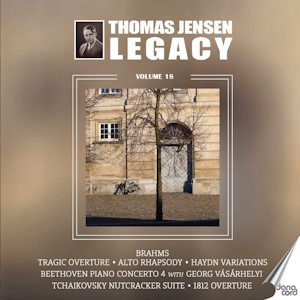
Thomas Jensen (conductor)
Legacy Volume 18
rec. 1961-63, Danish Radio Concert Hall, except Tchaikovsky Serenade and Symphony 5, from Tono 78s, 1945
Texts included with English translations
Danacord DACOCD928 [141]
Beethoven, Brahms and Tchaikovsky form the focus of this 18th volume devoted to Thomas Jensen. Almost everything, bar two movements from 1945 Tono 78s, comes from live broadcasts given soon before Jensen’s death.
From October 1961 comes a strongly argued Tragic Overture – cogent and concise – as well as the less-often-heard Schicksalslied, with the Danish Radio Choir showing once again in this series what a fine chorus they were. This is a particularly sensitively shaped performance. The performance of the Alto Rhapsody is especially poignant given Jensen died only two months later at the early age of 65. It’s sung by the excellent contralto Gurli Plesner, a company member of the Copenhagen Royal Theatre, here proving she has the voice, and the gravitas, to do justice to the music without feeling the need to elasticate it to Ferrier-like lengths.
The Haydn Variations come from a concert given the previous year, June 1962. Brahms had long been a Jensen reportorial strength; indeed, it was a strength inculcated by several conductors with Danish orchestras from the 1930s onwards and the Royal Danish Orchestra play with character and a crisply engaging wit. The last two items on CD1 are the Tono 78s, heard in adequate estate; the Waltz from Tchaikovsky’s Serenade for Strings and the slow movement from the Fifth Symphony, compete with some laminate thumps in places.
The first of the large-scale works on CD2 is Beethoven’s Fourth Piano Concerto played by the Hungarian-born but Danish-domiciled Georg Vásárhelyi, who’d come to the country in 1937. He made a set of the first two Brahms Sonatas, and the FAE movement, with his eminent compatriot Emil Telmányi with whom he also recorded Sibelius’ Danse Champêtre No.1 in 1936. He was a significant figure in Danish music but not as much as Victor Schiøler, to whom Danacord has devoted multiple volumes. His playing in the Beethoven, which comes from the same concert that gave us the Tragic Overture and Schicksalslied, veers from the commanding to the frankly slapdash. He had been a pupil of both Bartók and Edwin Fischer and at his best shows the eminent Fischer’s influence and insight, but he is too often digitally fallible.
The 11 March 1962 performance of The Nutcracker Suite is heard in first class sound – by some way the best in the set – and its clarity allows one to enjoy the Danish winds in particular as well as the pert strings. This, in any case, is a trim and communicative performance. The two-for-the-price-of-one release ends with a fiery 1812 overture from the same concert, with a full complement of Jensen’s athletic vigour.
There are the expected fine notes, the joint work of Martin Granau and Peter Quantrill and texts and translations (into English) of the Schicksalslied and Alto Rhapsody are included.
One further piece of good news is that there is no indication that this series has run out of material.
Jonathan Woolf
Help us financially by purchasing from


Contents
Johannes Brahms (1833-1897)
Tragic Overture, Op.81 (1880)
Schicksalslied, Op.54 (1868-71)
Alto Rhapsody, Op.53 (1869)
Gurli Plesner (contralto)
Haydn Variations, Op.56a (1873)
Pyotr Ilyich Tchaikovsky (1840-1893)
Serenade for Strings in C, Op.48: II Valse (1880)
Symphony No.5 in E minor, Op.64: II Andante cantabile (1888)
Danish Radio Choir/Danish Radio Male Choir/Royal Danish Orchestra
Ludwig van Beethoven (1770-1827)
Piano Concerto No.4 in G, Op.58 (1805-06)
Georg Vásárhelyi (piano)
Pyotr Ilyich Tchaikovsky
The Nutcracker Suite, Op.71a (1892)
1812 Overture, Op.49 (1880)
Danish Radio Symphony Orchestra


















